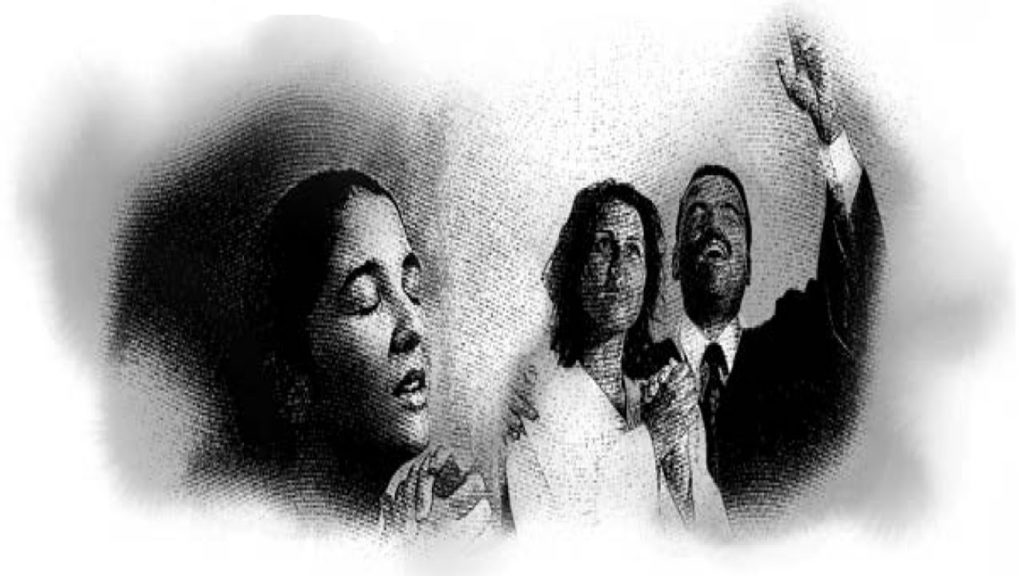Baptism in the Holy Spirit

Nearly a thousand years before it happened, Joel prophesied a time when the Holy Spirit would be poured out on all people. Joel 2:28-29
“And afterwards, I will pour out my Spirit on all people. Your sons and daughters will prophesy, your old men will dream dreams, your young men will see visions. Even on my servants, both men and women, I will pour out my Spirit in those days.
This prophecy began to be fulfilled at the Day of Pentecost as Peter explained to the crowd what they saw happening before their very eyes:
No, this is what was spoken by the prophet Joel: “‘In the last days, God says, I will pour out my Spirit on all people. Your sons and daughters will prophesy, your young men will see visions, your old men will dream dreams. Even on my servants, both men and women, I will pour out my Spirit in those days, and they will prophesy. Acts 2:16-18
John the Baptist said that Jesus would baptize in the Holy Spirit. (Matthew 3:11, Mark 1:8, Luke 3:16, John 1:33)
Before His ascension to heaven, Jesus told His disciples not to leave Jerusalem, but to wait for the baptism of the Holy Spirit (Acts 1:4-5). He told them that they would receive power when the Holy Spirit comes upon them and that they would be His witnesses in Jerusalem, and in all Judea and Samaria and to the ends of the earth. (Acts 1:8)
The ‘power’ that Jesus talked about is where we get our English word, ‘dynamite’. Jesus was telling them that they were to wait to receive the power that would be necessary to fulfil His great commission to us all which is to “go and make disciples of all nations, baptizing them in the name of the Father and of the Son and of the Holy Spirit, and teaching them to obey everything I have commanded you. (Matthew 28:19-20) In other words, we are not going to be very effected witnesses for Him until we have received this baptism in the Holy Spirit.
Here are two verses that clearly show that 1) this baptism in the Spirit is separate from receiving the Holy Spirit which is necessary for salvation and 2) that the baptism in the Holy Spirit is still a valid experience for us today and was not just for the early Apostolic Christians.
Peter replied, “Repent and be baptized, every one of you, in the name of Jesus Christ for the forgiveness of your sins. And you will receive the gift of the Holy Spirit. The promise is for you and your children and for all who are far off for all whom the Lord our God will call.” Acts 2:38-39
1) In order to repent and then be baptised, a person has to already have the Holy Spirit. Therefore, Peter, was saying that after becoming a believer and being baptised a person could then receive the gift of the Holy Spirit; baptism in the Holy Spirit.
2) The gift was not just available for those present on the Day of Pentecost, but for all their descendants, to whom the Lord may call; and therefore that includes us!
When we be become a Christian we receive the indwelling of the Holy Spirit.
When we are baptised in the Holy Spirit we receive the in-filling of the Holy Spirit (remember “baptism” means complete immersion).
Here’s what happened on the Day of Pentecost as recorded for us in the book of Acts:
When the day of Pentecost came, they were all together in one place. Suddenly a sound like the blowing of a violent wind came from heaven and filled the whole house where they were sitting. They saw what seemed to be tongues of fire that separated and came to rest on each of them. All of them were filled with the Holy Spirit and began to speak in other tongues as the Spirit enabled them.
Now there were staying in Jerusalem God-fearing Jews from every nation under heaven. When they heard this sound, a crowd came together in bewilderment, because each one heard their own language being spoken. Utterly amazed, they asked: “Aren’t all these who are speaking Galileans? Then how is it that each of us hears them in our native language? Parthians, Medes and Elamites; residents of Mesopotamia, Judea and Cappadocia, Pontus and Asia, Phrygia and Pamphylia, Egypt and the parts of Libya near Cyrene; visitors from Rome (both Jews and converts to Judaism); Cretans and Arabs—we hear them declaring the wonders of God in our own tongues!” Amazed and perplexed, they asked one another, “What does this mean?” Some, however, made fun of them and said, “They have had too much wine.” Acts 2:1-13
More Examples in the Book of Acts
Acts 8
Here we read about some people in Samaria coming to faith and being baptised through the ministry of Philip (Acts 8:12). Peter and John were then sent from Jerusalem to Samaria because they had heard that the Holy Spirit had not yet come upon any of the believers there. (Acts 8:14-16). Peter and John placed their hands on them and they received the Holy Spirit (Acts 8:17).
Simon (the sorcerer) saw that they had received the Holy Spirit (Acts 8:18) which would imply that just like in Acts 2:1-13, there was accompanying evidence to show that the Holy Spirit had been received. On the Day of Pentecost it was clearly people praying in other tongues and declaring the wonders of God. In Acts 8, it doesn’t say what the visible or audible evidence was.
Acts 9
Saul (who became Paul) receives the baptism in the Holy Spirit.
Acts 10
The household of Cornelius received the baptism in the Holy Spirit which was evidenced by them speaking in tongues and praising God (Acts 10:44-46).
Acts 19
Paul arrived in Ephesus and discovered 12 disciples who hadn’t yet received the Holy Spirit. So, he laid his hands on them on them and they received the baptism in the Holy Spirit which was evidenced by them speaking in tongues and prophesying (Acts 19:6).
From all the examples given above, we see that a biblical evidence of a person receiving the baptism in the Holy Spirit could be:
- speaking in tongues
- praising God
- prophesying
Ephesians 5:18 instructs us to keep being filled with the Holy Spirit. We see a few examples in the book of Acts where people were filled again after the initial Baptism in the Holy Spirit.
Acts 4:8, Acts 4:31, Acts 7:55, Acts 13:9, Acts 13:52
It’s not just a coincidence that twice alcohol is mentioned at the same time as the in-filling of the Holy Spirit. Firstly, on the Day of Pentecost, the observers of the outpouring of the Spirit thought that the disciples had, had too much wine (Acts 2:13). Secondly, in Ephesians 5:18, we are told not to get drunk on wine but to be being filled with the Holy Spirit.
The reason behind this is that alcohol is the devils counterfeit for the in-filling of the Holy Spirit.
Why do so many people drink alcohol and what are some of the alluring ‘benefits’? Well, firstly, how many people do you know who will say that after a hard day at work, they like to open up a bottle of wine? Frankly, it’s scary how many people I know who would openly admit this. They do it to get a sense of peace and relaxation. Others might drink so that they can be bolder and come out of themselves, especially to socialize and have fun. People feel they laugh and have fun after a few drinks. Many people don’t feel comfortable in their own skin and alcohol helps them to behave differently to what they normally would, especially to gain acceptance. Other’s when they drink, get violent; they want to fight. Others might drink to mask pain and hurt. People drink to get comforted, especially after suffering a loss. People will drink when they are scared. Many people under the influence of alcohol will claim that they cannot remember what happened, they lose control of their senses.
I’m not against alcohol per se; I quite like a glass of wine with a nice meal. The bible doesn’t say that alcohol is bad in the same way that it also says that money is not bad (it’s just the love of money that is the root of all kinds of evil). The bible just says that we should not get dunk (intoxicated).
Here’s the deal, the Holy Spirit will far, far outweigh anything that alcohol has to offer. Here are just some of the benefits or fruits as the bible calls them:
love, joy, peace, patience, kindness, goodness, faithfulness, gentleness and self-control (Galatians 5:22-23)
The Holy Spirit will fill a person with boldness; they won’t have fear, they will know real love and have self-control and a sound mind (1 Timothy 1:7).
The Holy Spirit is called the Comforter (John 14:26).
The Holy Spirit will enable us to know that we are accepted by God (Romans 8:15).
Baptism in the Holy Spirit is Vital for Every Believer
It seems abundantly clear to me that the normal pattern of events for a person becoming a Christian are:
1) Repentance
2) Belief in the Gospel & subsequent salvation and new birth (re-generation)
3) Baptism in water
4) Baptism in the Holy Spirit
Just as baptism in water should take place as soon after conversion as possible, so should the baptism in the Holy Spirit.
We have already seen that the Holy Spirit is a person (Who is the Holy Spirit) So, I’m not using this example in a wrong sense. But, not being baptised in the Holy Spirit is like trying to drive a Ferrari, ever so slowly because the fuel tank is almost on empty. Imagine if the tank was full and you had unlimited resources to keep filling it; how and where would you drive it then?
Jesus Himself told us that we require the power of the Holy Spirit to be His witnesses and to do everything we are called to do. We need the Baptism of the Holy Spirit to be able to operate in the Gifts of the Spirit. It will drastically affect our prayer life, worship and the contribution that we can make within the Body of Christ.
To receive the Baptism of the Holy Spirit we need only ask God. Please see my previous blog: How to Receive the Fullness of the Holy Spirit. We can also receive this baptism through the laying on of hands (which will be the subject of the next blog).
